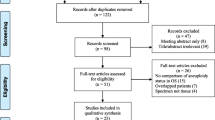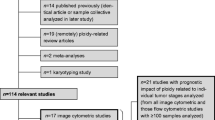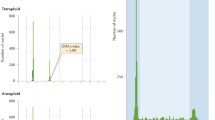Abstract
The mortality rate of gastric cancer in the Chinese population has reached a plateau. The main prognostic factor for gastric adenocarcinoma is recognized as tumor stage. Recently, abnormalities in DNA content have been considered as a new prognostic factor. Whether abnormal DNA content can be used as a prognostic tool for Chinese patients with gastric cancer is unknown. To investigate this relation DNA ploidy and prognosis of gastric cancer patients were studied using paraffin-embedded specimens. A group of 104 newly diagnosed and surgically resected gastric cancer specimens obtained from January 1984 to December 1986 were examined for DNA content by flow cytometry. The quality of flow cytometry was acceptable with a mean coefficient of variance of 5.45. The results showed that 38 cases (36.5%) had DNA aneuploidy; 42 cases had metastatic lymph nodes with enough tumor cells, and 31.0% of these cases had DNA aneuploidy. DNA aneuploidy of primary tumors was correlated to lymph node metastasis and patient's age, whereas DNA aneuploidy of metastatic lymph nodes was significantly correlated to the serosal invasion of the gastric wall at the primary site. The important parameters for prognosis were curability of surgical resection, serosal invasion, tumor size, and distant metastasis. DNA aneuploidy of both primary tumors or metastatic lymph nodes appeared to be unrelated to the prognosis of gastric adenocarcinoma in Chinese patients. We therefore propose that DNA aneuploidy of gastric cancer is associated with tumor growth but not biologic aggressiveness.
Résumé
La mortalité en rapport avec le cancer gastrique en Chine a atteint un plateau. Le facteur pronostique majeur reconnu par tous est le stade tumoral. Récemment, les anomalies de l'ADN ont été proposées comme un facteur pronostique nouveau. Que l'ADN puisse être utilisé comme un facteur pronostique dans la population chinoise n'est pas connu. Pour examiner ce problème, la ploïdie ADN a été étudiée sur des préparations de paraffine et comparée au pronostic des patients ayant un cancer gastrique. Cent quatre pièces de gastrectomie réséqués chirurgicalement entre Janvier 1984 et Décembre 1986 ont été exammés pour leur contenu en ADN par la cytométrie de flux. La qualité de cytométrie de flux a été acceptable avec un coefficient de variance moyen de 5.45. Les résultats ont montré que trente-huit cas (36.5%) avaient une aneuploïdie d'ADN. Dans 42 cas, les ganglions métastatiques contenaient suffisamment de cellules malignes dont 31% avaient une aneuploïdie d'ADN. L'aneuploïdie d'ADN des tumeurs primitives était corrélé avec les métastases ganglionnaires et l'âge, alors que l'aneuploïdie des ganglions métastatiques était corrélé de façon significative avec l'invasion de la séreuse au niveau de la tumeur. Les paramètres importants du pronostic étaient la curabilité par la résection chirurgicale, l'invasion de la séreuse, la taille de la tumeur et l'existence de métastases à distance. Cepencant, l'aneuploïdie d'ADN des tumeurs primitives comme celle des ganglions métastatiques ne paraît pas être corrélée avec le pronostic des cancers gastriques de la population chinoise. Nous suggérons que l'aneuploïdie des cancers gastriques est lié a la croissance tumorale mais pas à l'agressivité biologique.
Resumen
La tasa de mortalidad del cáncer gástrico en la población china ha llegado a un “plateau”. Se reconoce que el principal factor de pronóstico en el adenocarcinoma gástrico es el estado del tumor, pero recientemente se considera que las anormalidades en el contenido del DNA nuclear constituyen un nuevo factor de pronóstico. Sin embargo, no se sabe si tales anormalidades en el contenido de DNA pueden ser utilizadas como un elementos de pronóstico en pacientes chinos con cáncer gástrico. Con el objeto de investigar esta relación de la ploidia de DNA con el pronóstico, se estudiaron especímenes incluidos en parafina. Ciento cuatro especímenes de resección gástrica obtenidos ente enero de 1984 y diciembre de 1987 fueron examinados para contenido de DNA mediante citometría de flujo. La calidad de la citometría de flujo apareció aceptable, con un coeficiente de variación promedio de 5.45. Se encontró que 38 casos (36.5%) exhibían aneuploidia de DNA; 42 casos presentaban ganglios linfáticos metastásicos con suficientes células tumorales, y 31% de estos casos tenían aneuploidia de DNA. La aneuploidia de los tumores primarios apareció correlacionada con las metástasis ganglionares y con la edad del paciente, en tanto que la aneuploidia de los ganglios metastásicos apareció significativamente correlacionada con la invasión de la serosa en el lugar del tumor primario. Los más importantes parámetros de pronóstico fueron la resección de tipo curativo, la invasión de la serosa, el tamaño del tumor y las metástasis distantes.
La aneuploidia tanto del tumor primario como de los ganglios metastásicos no apareció correlacionada con el pronóstico en este grupo de pacientes chinos.
Por lo tanto, planteamos que la aneuploidia de DNA en el cancer gástrico está asociada con el crecimiento del tumor pero no con su agresividad biológica.
Similar content being viewed by others
References
Department of Health, Executive Yuan, Republic of China: Health and Vital Statistics, 1964–91
Davis, G.R.: Neoplasms of the stomach. In Gastrointestinal Disease (3rd ed.), M.N. Sleiserger, J.S. Fordtran (editors). Philadelphia, Sauders, 1983, pp. 578–601
Barlogie, B., Drewunko, B., Schardey, M., Lohrs, U.: DNA-ploidy and survival in gastric carcinomas: a flow cytometric study. Virchows Arch. [Pathol. Anat.] 418:301, 1991
Teodori, L., Capurso, L., Cordelli, E., et al.: Cytometrical determined relative DNA content as an indicator of neoplasia in gastric lesions. Cytometry 5:63, 1984
Yonemura, Y., Ooyama, S., Sugiyama, K., et al.: Retrospective analysis of the prognostic significance of DNA ploidy patterns and S-phase fraction in gastric carcinoma. Cancer Res. 50:509, 1990
De Aretxabala, X., Yonemura, Y., Sugiyama, K., et al.: DNA ploidy pattern and tumor spread in gastric cancer. Br. J. Surg. 75:770, 1988
Sowa, M., Yoshida, H., Kato, Y., Nishimura, M., Kamino, K., Umeyama, K.: An analysis of the DNA ploidy patterns of gastric cancer. Cancer 62:1325, 1988
Korenaga, D., Haraguchi, M., Okamura, T., Baba, H., Saito, A., Sugimachi, K.: DNA ploidy and tumor invasion in human gastric cancer. Arch. Surg. 124:314, 1989
Wyatt, J.I., Quirke, P., Ward, D.C., et al.: Comparison of clinicopathological and flow cytometric parameters in prediction of prognosis in gastric cancer. J. Pathol. 158:195, 1989
Sasaki, K., Takahashi, M., Hashimoto, T., Kawachino, K.: Flow cytometric DNA measurement of gastric cancers: clinico-pathological implication of DNA ploidy. Pathol. Res. Pract. 184:561, 1989
Inukuchi, K., Kodama, Y., Sasaki, O., Kamegawa, T., Okamura, I.T.: Differentiation of growth patterns of early gastric carcinoma determined by cytophotometric DNA analyses. Cancer 51:1138, 1983
Macartney, J.C., Camplejohn, R.S.: DNA flow cytometry of histological material from dysplastic lesions of human gastric mucosa. J. Pathol. 150:113, 1986
Zuo, L.F.: DNA ploidy in gastric precancerous lesions. Chung-Hua Chung Liu Tsa Chih 13:180, 1991
Hirose, K., Nakagawara, G.: DNA ploidy pattern of gastric carcinomas and its relations with histological type and invasion pattern. J. Jpn. Surg. Soc. 91:345, 1990
Umehara, Y., Miyahara, T., Yoshida, M., et al.: An analysis of the cellular DNA contents in lung metastasis stomach cancer. Jpn. J. Cancer Clin. 36:469, 1990
Charnley, G., Tannenbaum, S.R.: Flow cytometric analysis of the effect of sodium chloride on gastric cancer risk in rat. Cancer Res. 45:5608, 1985
Ochi, K., Takeshita, K., Sunagawa, M., Habu, H., Hoshi, K., Tanaka, N.: Sequential changes in nuclear DNA content by chemotherapy observed in experimental canine gastric cancer. Gastroenterol. Jpn. 19:563, 1984
Silecchia, G., Materia, A., Spaziani, E., et al.: Sequential evaluation of gastric intraluminal prostaglandin E2 release, acid secretion and DNA flow cytometry in N-methyl-N-nitro-N-nitrosoquanidine gastric carcinogenesis in rat. Cancer Lett. 49:73, 1990
Katayanagi, N.: An experimental study of anticancer agent sensitivity test in human gastric cancer cell lines by flow cytometry. J. Jpn. Surg. Soc. 91:827, 1990
Petrova, A.S., Subrichina, G.N., Tschistjakova, O.V., Lukina, T.A., Weiss, H., Wildner, G.: Flow cytofluorometry cytomorphology and histology in gastric carcinoma. Oncology 37:318, 1980
Hedley, D.W., Freidlander, M.L., Taylor, I.W., Rugg, C.A., Musgrove, E.A.: Method for analysis of cellular DNA content of paraffin-embedded pathological material using flow cytometry. J. Histochem. Cytochem. 31:1333, 1983
Nakajima, T., Kajitani, T.: Surgical treatment of gastric cancer with special reference to lymph node dissection. In Diagnosis and Treatment of Upper Gastrointestinal Tumours, M. Friedman, M. Ogawa, D. Kisner (editors). Amersterdam, Excerpta Medica, 1981, pp. 207–223
Curtis, R.E., Kennedy, B.J., Myers, M.H., Hankey, B.F.: Evaluation of AJC stomach cancer staging using SEER population. Semin. Oncol. 12:21, 1985
Hiddemann, W., Schumann, J., Andreeff, M., et al.: Convention on nomenclature for DNA cytometry. Cytometry 5:445, 1984
Sasaki, K., Hashimoto, T., Kawachino, K., Takahashi, M.: Intramural regional differences in DNA ploidy of gastrointestinal carcinomas. Cancer 62:2569, 1988
Baretton, G., Carstensen, O., Schardey, M., Lohrs, U.: DNA-ploidy and survival in gastric carcinomas: a flow cytometric study. Virchows Archiv. [Pathol. Anat.] 418:301, 1991
Valen, B., Viste, A., Haugstvedt, T., Eide, G.E., Soreide, O., members of the Norwegian Stomach Cancer Trial. Treatment of stomach cancer, a national experience. Br. J. Surg. 75:708, 1988
Dahlberg, S., Lee, P.-Y.: Prognostic factors in clinical trials. Breast Cancer Res. Treat. 22:193, 1992
De Aretxabala, X., Yonemura, Y., Sugiyama, K., et al.: Gastric cancer heterogeneity. Cancer 63:791, 1989
Wu, C.-W., Chi, J.-W., Chang, T.-J., Lui, W.-Y., P'eng, F.-K.: Sex hormone receptors in gastric cancer. Cancer 65:1396, 1990
Hedley, D.W., Freidlander, M.L., Taylor, I.W., Rugg, C.A., Musgrove, E.A.: DNA flow cytometry of paraffin-embedded tissue. Cytometry 5:660, 1984
Castedo, S., Correia, C., Gomes, P., et al.: Loss of Y chromosome in gastric carcinoma, fact or artifact? Cancer Genet. Cytogenet. 61:39, 1992
Kraemer, P.M., Petersen, D.G., Van Dilla, M.A.: DNA consistency in heteroploidy and the stem line theory of tumors. Science 174:714, 1971
Douglass, H.O., Jr., Nava, H.R.: Gastric adenocarcinoma-management of primary disease. Semin. Oncol. 12:32, 1985
Huang, Y.-S., Jung, Y.-F., Chan, H.-M., et al.: Gastric carcinoma: a clinicopathological six-year study. J. Surg. Assoc. R.O.C. 23:271, 1990
McGuire, W.L.: Breast cancer prognostic factors: evaluation guidelines. J. Natl. Cancer Inst. 83:154, 1991
Kimura, H., Yonemura, Y.: Flow cytometric analysis of nuclear DNA content in advanced gastric cancer and its relationship with prognosis. Cancer 67:2588, 1991
Filipe, M.I., Rosa, J., Sandy, A., Imrie, P.R., Omerode, M.G., Morris, R.W.: Is DNA ploidy and proliferative activity of prognostic value in advanced gastric carcinoma? Hum. Pathol. 22:373, 1991
Ballantyne, K.C., James, P.D., Robins, R.A., Baldwin, R.W., Hardcastle, J.D.: Flow cytometric analysis of the DNA content of gastric cancer. Br. J. Cancer 56:52, 1987
Baba, H., Korenaga, D., Okamura, T., Saito, A., Watanabe, A., Sugimachi, K.: Prognostic significance of DNA content with special reference to age in gastric cancer. Cancer 63:1768, 1989
Fujimaki, M., Soga, J., Wada, K., et al.: Total gastrectomy for gastric cancer: clinical considerations for 431 cases. Cancer 30:660, 1972
Nanus, D., Kelsen, D.P., Niedzwiecki, D., et al.: Flow cytometry as a predictive indicator in patients with operable gastric cancer. J. Clin. Oncol. 7:1105, 1989
Sasaki, O., Soejima, K., Haraguchi, Y.: Intra-tumor DNA ploidy distribution pattern and its relation to histologic type in gastric carcinoma. Pathol. Res. Pract. 188:545, 1992
Correa, P.: Clinical implications of recent developments in gastric cancer: pathology and epidemiology. Semin. Oncol. 12:2, 1985
Umehara, Y., Kimura, T., Yoshida, M., Oba, N., Harada, Y.: Comparison of flow cytometric DNA content in primary gastric carcinoma and metastases. J. Surg. Oncol. 50:156, 1992
Carter, K.J., Schaffer, H.A., Ritchie, W.P.: Early gastric cancer. Ann. Surg. 199:604, 1984
Nicolson, G.L.: Tumor cell instability diversification, and progression to the metastatic phenotype: from oncogene to oncofetal expression. Cancer Res. 47:1473, 1987
Author information
Authors and Affiliations
Rights and permissions
About this article
Cite this article
Shen, KL., Chu, CH. DNA ploidy and biologic aggressiveness of gastric adenocarcinoma in Chinese. World J. Surg. 18, 433–439 (1994). https://doi.org/10.1007/BF00316831
Issue Date:
DOI: https://doi.org/10.1007/BF00316831




